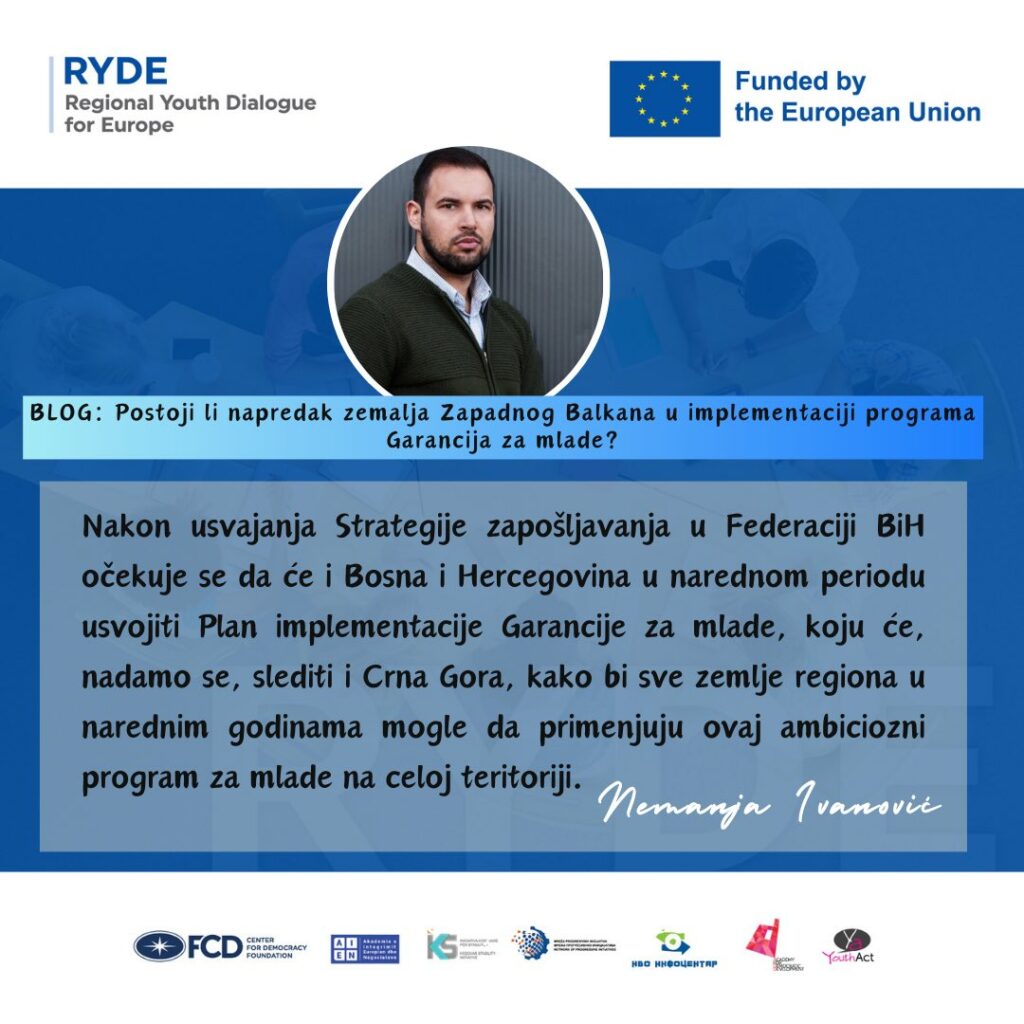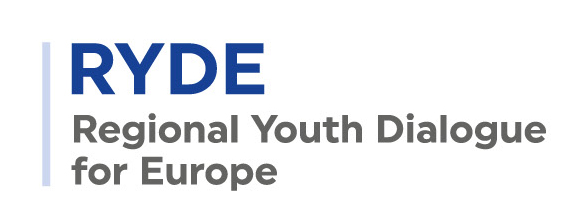Regional Youth Dialogue for Europe Project

Over the last few years, the youth unemployment rate has continuously decreased in all WB economies. However, it varies from economy to economy and remains higher compared to EU member states. The highest youth unemployment rate is in North Macedonia, at 34.9%, while the lowest is in Kosovo* – 21.4%. According to Eurostat datafrom November 2023, youth unemployment in the EU stands at 14.5%. A decade ago, this rate was roughly 24%. How did youth unemployment decrease by approximately 10% over the past 10 years in the EU despite the COVID-19 pandemic, the war in Ukraine, and other crises affecting the European labour market?
Throughout 2013, the Youth Guarantee programme was initiated by the European Commission and was adopted by the European Council in the same year. The Youth Guarantee is the political commitment of all EU member states to provide all young people aged 15 to 29 with an offer of employment, an apprenticeship, internship, volunteering, or further education within four months of completing formal education or losing employment. The Youth Guarantee is a commitment of all relevant sectors in the country, including the executive authorities, employment agencies, civil society organisations, and the business sector, i.e. employers. The main goal of the programme is the inclusion of NEET youth, that is, those not in employment, education, or training.
With the Economic and Investment Plan for the Western Balkans published by the European Commission in October 2020, the Youth Guarantee programme became an obligation for Western Balkan economies aspiring to EU membership. They committed to implementing this programme, as stated in the Western Balkans Declaration on the Sustainable Integration of Youth into the Labour Market, adopted at the Second Ministerial Meeting of the European Union – Western Balkans held on 8 July 2021, in Slovenia. Western Balkan economies are at different stages of implementing the Youth Guarantee programme. North Macedonia, which initiated the programme in 2018, is the most successful regional example. Implementation plans for the Youth Guarantee have been adopted in Serbia, Kosovo*, and Albania, while Montenegro and Bosnia and Herzegovina are still awaiting adoption.
As mentioned earlier, North Macedonia is the most successful country in the region in implementing the Youth Guarantee. From 2017 to 2019, youth unemployment decreased by nearly 9%. The new Implementation Plan for the Youth Guarantee for the period 2023-2026 was adopted by the Government of North Macedonia in March 2023. North Macedonia has set a target of 30%, meaning it considers the Youth Guarantee successful if a minimum of 30% of young people who go through the programme find employment, apprenticeships, volunteering, or further education and training within a four-month period. Out of 19,322 young people who participated in the Youth Guarantee programme in 2021, 41% were granted opportunities for employment, volunteering, or further education. In 2022, over 20,000 youths participated in the programme, and 43% were successful in securing employment or opportunities for training once they had completed the programme. Therefore, North Macedonia is considered exceptionally successful in implementing this programme, having achieved and exceeded the set goal of 30%.
Despite the successful integration of a large number of programme participants into the labour market, the implementation of the Youth Guarantee also contributes to strengthening institutions. The Ministry of Labour and Social Policy is the main driver of the implementation process, and a Coordination Council for the Youth Guarantee has been established to oversee the programme’s implementation. However, the youth unemployment rate in North Macedonia in 2022 stood at 34.9%, which is still nearly double the EU average, standing at 14.5%, and remains the highest youth unemployment rate in the entire region. The European Commission Progress Report on North Macedonia for 2023, states that active labour market measures and the Youth Guarantee programme are currently inadequately monitored, evaluated, and assessed. A key challenge of programme implementation is the limited financial resources the Government of North Macedonia is unable to secure.
The Youth Guarantee in Serbia has been recognised in the new National Employment Strategy for the period 2021-2026 and the Youth Strategy adopted in January 2023. The youth unemployment rate in Serbia for the year 2022 stood at 24.9%, while the unemployment rate for so-called NEET youth – those not employed, not in the educational system, nor in training – stood at roughly 15%. In late December 2023, the Government of the Republic of Serbia adopted the Implementation Plan for the Youth Guarantee. The pilot programme will be conducted in three branches of the National Employment Service – in Kruševac, Sremska Mitrovica, and Niš – from January 2024 to the end of 2026. The aim is to expand the programme across the entire territory of the Republic of Serbia. During the EU Opportunities Week in 2023, the Republic of Serbia and the European Union signed a financial assistance agreement amounting to EUR 5.5 million, directed towards the implementation of the Youth Guarantee. This funding is specifically for piloting the programme in the mentioned three branches. Institutions in Serbia emphasise that there are currently insufficient capacities for the implementation of this programme throughout the entire country, but full implementation of the programme at the national level is one of the main priorities of the Operational Programme within IPA III 2023-2027. The programme is led by the Ministry of Labour, Employment, Veterans, and Social Affairs of the Government of the Republic of Serbia, which has established a Coordination Body to develop and monitor the implementation plan for the Youth Guarantee. They have also formed an Expert Group to carry out preparatory activities.
Kosovo* is still in the early preparatory phase regarding negotiating Chapter 19, which pertains to social policy and employment. However, the European Commission Progress Report on Kosovo* for 2023 notes that some progress has been made in preparing for the implementation of the Youth Guarantee, following the Implementation Plan adopted in November 2022. The report emphasises the need to continue with the Implementation Plan and creating conditions for piloting the programme in two municipalities – Mitrovica and Uroševac. The youth unemployment rate in Kosovo* saw a remarkable decrease of 16.6% in 2022. In 2021, the rate was 38%, dropping to 21.4% in 2022. The Employment Agency of Kosovo* is undergoing restructuring to enable the implementation of the programme. However, the European Commission’s report highlights the significant challenge of a lack of human resources in public employment services and an outdated information system.
According to the European Commission Progress Report on Albania for 2023, preparations for the implementation of the Youth Guarantee programme have progressed. It is deemed necessary to commence piloting the programme to enable its implementation across the entire country. Albania has adopted the Implementation Plan for the Youth Guarantee as an annex to the new National Youth Strategy for the period 2023-2030. The overall process is led by the Ministry of Finance and Economy of the Republic of Albania. The youth unemployment rate for 2022 stood at 27.8%, while the unemployment rate for so-called NEET (Not in Education, Employment, or Training) youth stood at 23.4%.
Montenegro and Bosnia and Herzegovina are the only countries in the region that have not yet adopted the Youth Guarantee Implementation Plan. The youth unemployment rate in Montenegro stood at 28.3% in May 2023. According to the Progress Report for Montenegro in 2023, the European Commission recommends strengthening the Employment Agency and preparing for the implementation of the Youth Guarantee. A Working Group for the Youth Guarantee programme has been formed to enhance the draft Implementation Plan, collaborating with experts from the International Labour Organisation.
Bosnia and Herzegovina is ranked last in the region relative to implementation of the Youth Guarantee programme. The Progress Report of the European Commission on Bosnia and Herzegovina for 2023, highlights that limited progress has been made regarding the finalisation and adoption of the Youth Guarantee Implementation Plan. In October 2023, the Employment Strategy in the Federation of Bosnia and Herzegovina for the period 2023-2030 was finally adopted, recognising the Youth Guarantee as a completely new youth employment model. The lengthy process of its adoption represented a major obstacle to the Youth Guarantee programme in Bosnia and Herzegovina. The programme’s pilot phase has already begun, with two smaller municipalities, Visoko and Čitluk, chosen for the pilot. After the pilot phase, expansion across the entire territory of Bosnia and Herzegovina is expected. At the national level, the Ministry of Civil Affairs of Bosnia and Herzegovina is responsible for the implementation process, while the Federal Ministry of Labour and Social Policy is in charge of implementing the programme in the Federation of Bosnia and Herzegovina. Information about the Youth Guarantee in the Republika Srpska entity is not available on the internet, nor is it mentioned in the annual reports of the European Commission. The youth unemployment rate in Bosnia and Herzegovina is the highest in the entire region, reaching 33.47% for the year 2022.
The key to the successful implementation of the Youth Guarantee programme lies in the intensive collaboration of all sectors in the country—from the governments responsible for providing financial resources for implementation to employers and civil society organisations. Once the Employment Strategy is adopted in the Federation of Bosnia and Herzegovina, it is expected that Bosnia and Herzegovina will adopt the Implementation Plan in the coming period. We hope that this will be followed by Montenegro, allowing all economies in the region to implement this ambitious programme for young people across their territories in the coming years. However, strong political will from all governments in the region will be essential for this, as only they can secure financial support for successful implementation.
Author: Nemanja Ivanović, Youth Activist and Member of the Governing Board of the Social Democratic Party
* This publication was funded by the European Union. Its contents are the sole responsibility of the Center for Democracy Foundation and do not necessarily reflect the views of the European Union.





